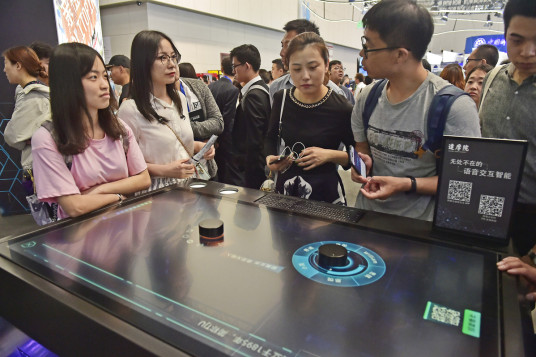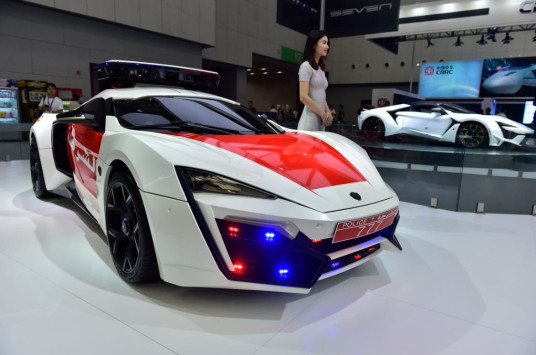Innovation leapfrogs developmental barriers
 |
|
Visitors experience intelligent interactive voice technology at Alibaba Group's booth at the 3rd World Intelligence Congress held from May 15 to 20 in Tianjin. [Photo by Jia Lei/For China Daily] |
As technological winds of change sweep various sectors, the digital dimension promises to transform the economy
Five technologies-5G, the internet of things, artificial intelligence/machine learning, robotics, and cloud computing-will come to fruition over the next decade and enable the transformation of industries throughout the Chinese economy.
That was the consensus view at the latest World Intelligence Congress, an annual gathering of business leaders, government officials, and university researchers that the northern Chinese city of Tianjin has been organizing since 2017.
Tianjin was officially designated by the national government as a "National Advanced Manufacturing R&D Base" in 2014, building on the city's industrial heritage.
The 3rd WIC, which was held from May 15 to 20, attracted thousands of visitors. Experts discussed new technologies and their likely impact on the economy.
Zhang Liming, general manager of the China Hualu Group Co Ltd, a Dalian, Liaoning province-based electronics manufacturer, summed up the changes: "Now we can combine the agricultural economy, industrial economy and digital technology, so as to realize online and offline sales, thus expanding the market, reducing the intermediate links. This allows us to adjust rapidly supply and demand. So, the digital economy is not a fictitious economy, but an improvement of the real economy."
The WIC's agenda, which lists half-day and all-day forums on special topics, illustrates the widespread effects that the new technologies will have throughout the economy.
Sessions focused on smart health and medical care, intelligent agriculture, self-driving vehicles and smart urban planning. Many forums concentrated on ways that the new technologies will transform manufacturing processes and business models.
In the coming decade, businesses will have access to extensive real-time data using sensors embedded in machines. Data will also flow in through online or cloud-based information and from, for example, both airborne and underwater drones. Artificial intelligence, which should more specifically be called machine learning, will help companies make sense of the mass of data. Robots of all sorts will improve efficiency.
The new technologies will also improve the effectiveness of education and allow children outside the big cities to get equal access, according to Jin Lei, vice-president of Netease Youdao.
"AI technology can break through the space-time barrier of education. In such a large country as China, the imbalance of educational resources is inevitable and natural … Last year, we saw tens of thousands of students in poor areas of Yunnan (province) and Chengdu (in Sichuan province) who were able to attend classes (electronically) with students in the cities. Many of them have been admitted to Tsinghua University and Peking University (in Beijing) … I believe that in the future, in the most remote corners of China, the best teachers can be heard giving lectures. This can become routine, rather than a luxury," he said.
 |
|
An intelligent self-driving police car on display at the 3rd WIC. [Photo by Jia Lei/For China Daily] |
The new technologies may even shape our access to and perception of art. In the main hall of the Meijiang exhibition center, venue for the WIC, the Beijing-based display technology company BOE exhibited its iGallery displays, which can be used to show great works of art from around the world. Astonishingly, these displays looked very much like oil on canvas, even when examined close up.
Many participants stressed that being able to develop and sell technologies around the world is crucial for their businesses. For example, Farouz Abus, CEO of the French engineering firm Akka, noted that his company has research centers in Germany, Dubai (in the United Arab Emirates), and China. "Our sales revenue is also growing at a double-digit rate, thanks to the development of the Chinese market."
In an interview with China Daily, Martin Winchell, chairman of the American Chamber of Commerce Tianjin chapter, said: "US firms in Tianjin have long been focused on high-value advanced manufacturing. Low-end production left the city a long time ago. Several US firms have their China headquarters in Tianjin, while others have production in Tianjin that is part of their global supply chain, meaning not only are the products coming out of Tianjin the best in class, they are distributed and used across the world in a fully integrated supply chain ... We expect companies to accelerate this investment in the coming years should a trade agreement be reached."
Companies and governments are just at the first stage of figuring out how to use the new capabilities. In his talk to the WIC, Liu Gang, professor of economics at Tianjin's Nankai University stressed that it is the integration of AI with the real economy that creates new opportunities and new value.
Jay Lee, distinguished professor of advanced manufacturing at the University of Cincinnati and founding director of the US National Science Foundation Center for Intelligent Maintenance Systems, stressed the importance of using sensors in machines to reduce maintenance, energy, and labor costs.
For example, in shipping, a combination of AI and real-time sensors can plot a course that saves 6 percent of energy usage. At the WIC, he described his work with Foxconn to develop a "lights off" factory that needs fewer low-skilled workers.
This move toward advanced manufacturing will be key as China continues to move toward a higher-wage, higher value-added economy.
Jay Siegel, dean of the Tianjin University Health Science Platform, discussed the impact of the new technologies on healthcare and medicine. He said that new sensors in phones, or non-invasive sensors combined with AI programs to process the data, can relieve doctors of many of their most routine tasks: "The vast majority of routinely considered health aspects involve sleep, nutrition, hygiene, and the maintenance of physiological balance. Talking to some Swiss health providers, they were saying that if you could get rid of the healthcare costs from normal maintenance, you could divert an enormous amount of resources to dealing with specific diseases. A lot of time is spent by doctors basically collecting this data."
He added that Tianjin University now has a medical AI department that deals with using AI for diagnostics as well as robotics.
Sun Pishu, chairman of Inspur, in his speech to the WIC, noted that in February the Tianjin Health Commission authorized his company to analyze the healthcare data for the entire city.
The new smart technologies will also transform the transportation systems in our cities. At the WIC, Sally Capp, mayor of Melbourne, said that sensors embedded in streets and parking lots, combined with open platforms and interactive sites, have eased traffic problems.
"The map shows drivers where parking spaces are, how much parking time is limited, and which parking spaces are reserved for the disabled. The map is updated every two minutes. This enables drivers to find parking spaces more efficiently, reduce parking time, reduce road use, and greatly reduce carbon dioxide emissions," Capp said.
Wang Chuanfu, chairman and president of BYD Co Ltd, said that cars themselves are becoming interconnected sensors. "Open City sensors will increase the mass data generated by hundreds of millions of mobile sensing terminals in cities, such as PM2.5, temperature, and images. This will bring changes to all walks of life, such as environmental protection, transportation, safety and insurance. Cities will be more intelligent. There are more than 3 million cars in Tianjin. Assuming four cameras per car, if these cameras are open, the whole city will have 12 million cameras. Like the moving nerve endings of the city, if a child is lost or an old man is lost, people can be found in minutes, and if a wallet is lost, it can be returned in minutes," he said.
Raj Reddy, an Indian-American professor of computer science at Carnegie Mellon University and winner of the Turing Award, the highest honor in computer science, said: "China has shocked me by demonstrating its ability to develop by leaps and bounds ... Through space technology, nuclear power technology, high-speed rail, supercomputers and other aspects, such as WeChat payments, 5G, et cetera, China repeatedly demonstrates its ability to leapfrog (barriers to) development, becoming the world leader in this new space."
